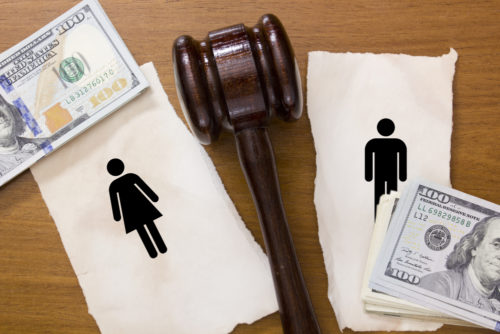Credit damage after a divorce is not uncommon. But what happened? Are the courts punishing you for having the gall to divorce someone and take their time away from a murder case?
The short answer is no, divorce does not directly affect your credit score. The longer answer, however, requires some explanation.
Table of Contents
Divorce Proceedings
First, some definitions. Divorce proceedings refers to the process of going through a divorce, and specifically court proceedings. Divorce proceedings start with filing for divorce and serving papers to your spouse, and end when the case is either completed or dismissed. If it is completed, you will receive a divorce certificate and a divorce decree.
Divorce Certificate
The certificate lists the names of both parties and the date and place it was finalized. According to LegalZoom, “A divorced person may use a certificate as evidence of the divorce for various legal purposes. For example, a divorced person may need a certificate for the state motor vehicle department if she wants to change her married name on her license.”
Divorce Decree
A decree has the same information as the certificate, as well as information provided by the court, including case number and the judge’s signature. “For example, if one spouse was awarded spousal support, the decree will state which spouse pays and how much. All the terms of the divorce, such as child custody and property division, are outlined in the decree, as well as other issues the parties agreed on or the judge decided,” LegalZoom says. Unlike a certificate, only one party usually gets a decree. They may need the decree to check the terms of the divorce, such as the spousal support amount owed, or to be used in court to petition changing said amount.
How Debts Are Assigned in a Divorce
Don’t worry, we’re almost to the meat of the article. There’s one last thing you need to understand about divorce before we get to credit: How debts are assigned. Laws vary by state, but generally, the court tries to balance debts between the spouses. However, that does not mean it’s all equal — the person who gets the house likely gets the entire mortgage, “balancing” out the fact that they get the home with the fact that it comes with a large debt. Community property states, such as California, see all property as jointly owned, and try to split everything down the middle. Finally, a prenuptial agreement will override these laws.
Adjust Your Budget
With all that out of the way, the main reason people see a drop in credit is failing to adjust their budget after being saddled with bills. In a household where both spouses worked, one income stream is about to dry up.
Now, you need to take a hard look at your budget and what you can afford. Can you still eat out at your favorite restaurant every weekend? What about the expensive bottles of wine you love? Overspending could lead to increased debt, and inability to pay your credit card bills.
Be warned that your ex, out of spite, might fail to pay their alimony or child support, ask for smaller payments, or quit their job. Do not count on alimony, child support, etc. to cover costs, for these reasons, and instead rely on your actual income.
Pay Your Bills and Debts
Speaking of bills, if only one spouse handled paying bills, such as utilities, credit cards or an auto loan, this could come as a surprise when you forget to pay the bill and your credit drops. On top of that, chances are, your interest rate will go up, temporarily, meaning you will owe even more money. You might have to sell your house or car, opting for downsizing, in order to pay bills. Divorce and debt become even more closely linked when someone is unable to adapt to their new lifestyle, wanting to keep everything the same as before despite not being able to.
Plus, you may have joint debts that were under both of your names. It’s time to cut financial links between you two and close joint accounts. Do this by both phone and in writing to cover your bases, and ask that the account not be re-opened with your name on it.
Unlike personal debts where only your name is on the account, joint debts can be paid by either party, but failure to pay penalizes everyone. Again, your ex-spouse might deliberately stop paying out of spite if they don’t care about their credit, while your credit also suffers.
Though this should go without saying, you will still need to pay your normal personal debts. These have not gone away, and still need to be paid on time, with at least the minimum payment, or you will take a credit hit.
Take Control of Your Credit Cards
Much like joint accounts, you need to restrict access or cancel credit cards that have your ex-spouse attached to them. This is especially true if you have them as an authorized user, but they do not jointly share the account.
The main reason you should take them off as an authorized user is that if they rack up a huge amount of debt, you are still responsible. This is not considered identity fraud, and you are on the line. The courts will simply say you should have been more careful in choosing authorized users for your card.
Keep Track of Your Credit
Now that you have a budget, you are adjusting to your new lifestyle, are paying bills on time, and have locked down your accounts, it’s time to keep track of your credit. If you haven’t done so before, be sure to request your one free report-per-bureau-per year, and be sure you know how to read the credit report.
As your life has recently been upended, it’s important to check for any errors on the report. You may find accounts that have both you and ex-spouse on them are still listed, and this could be hurting your credit score. Or, in a worst-case scenario, your ex-spouse may try to open accounts in your name, and you should be on the lookout for new accounts on your report. Disputing these errors could boost your score.
Can divorce affect credit? Indirectly, yes. It is not, however, a factor in credit score calculations. Divorce can lead to different or new bills, requiring a new budget. Late payments or failing to pay debts are factors, and can be the result of these changing debts. Be sure to prepare yourself and your accounts for the divorce, and you can weather the storm without harm to your credit score.
What else can affect your credit score? Find more articles in our credit score resource center.
Image Source: https://depositphotos.com/





